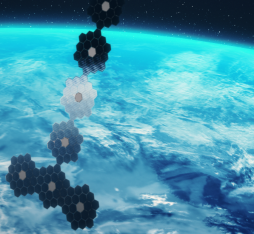Spintronics
Spintronics is an emerging discipline that harnesses a magnetic and quantum property of the electron called “spin”.
As its name implies, “spin” describes the angular momentum of a particle, i.e. the vector quantity that describes the rotation state of a system. This is due to its rotation upon itself, in the same way as that of a spinning top.
This angular momentum enables the particle to carry a magnetic charge, which makes it similar to a small magnet. It can then only take on one of two orientations in relation to a magnetic field : either the direction of the field or the opposite direction.
Hard drives were the first to benefit from this discovery. The reading of the magnetic orientation of bits (0 or 1) enables an increase in storage density by a factor of nearly one thousand.
The next stage aims to replace traditional random-access memory (RAM) by an MRAM, for “Magnetic Random-Access Memory”. Whereas RAM is volatile, MRAM is permanent: it is no longer necessary to reload an app on restarting a computer or to even install it locally. MRAM is also less energy-intensive.
Beyond storage, spintronics makes it possible to design new components such as magnetic sensors, microcontrollers, radio-frequency circuits, or chips for connected objects.
A study by advisory firm Mordor Intelligence valued the global market for these components at 3.62 billion dollars in 2019 and forecast that it will have a compound annual growth rate of over 47 %, reaching 26 billion dollars in 2025.
After two Nobel Prizes in Physics that paved the way – Louis Néel in 1970 and Albert Fert in 2007– France seems to be at the cutting-edge of this area (source L’Usine Nouvelle). France can rely on R&D laboratory Spintec and promising startups such as Crocus Technology, Antaïos, Hprobe, Crivasense Technologies, and Spin-Ion Technologies.
At the European level, the Spintronic Factory brings together academic and industrial players from the Old Continent such as startups RebusLabs (Switzerland), NanOsc (Sweden), or German semiconductor manufacturer Infineon Technologies.
At an international level, they face heavyweight American and Asian players such as IBM, Intel, Samsung and Toshiba who are making them do battle.



